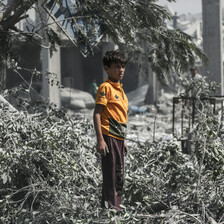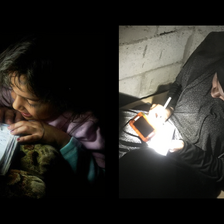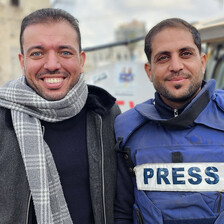The Electronic Intifada 12 August 2025

The date passed from one member of the author’s family to another.
It’s just a date. A single, four-centimeter piece of dried fruit. But here in Gaza, where nothing comes easily and everything holds meaning, even a date becomes a symbol of endurance, sacrifice and love.
I kept this date for six months. I’d found it and saved it for what I imagined would be the darkest days: the days when food would disappear from the shelves, when starvation would wrap itself around our lives, when sharing even a crumb would become an act of resistance.
Those days are now.
Like many Gazans, I love dates. My mother loves them too. A few weeks ago, I decided the time had come to part with my little treasure. I gave that single date to my mom. The next morning, she passed it on to my youngest sister, Nesma. And then Nesma gave it to our 2-year-old nephew Mo’men.
A quiet act of love
That one date, passed from hand to hand, became a quiet act of love in a world collapsing around us.
And so, when my mother gave Nesma the date, it was not just about food. It was a gesture of trust and hope: This is for you, my daughter. You need it more than I do.
And Nesma, in turn, chose to give it to Mo’men. He was born just two months before the war started and will grow up without his father, Moataz Rajab, who was killed during the genocide.
Moataz was a kind and educated man who earned his postgraduate degree in economics just one week before the war.
Mo’men will never remember his father’s voice. But at this moment, he received a date. And with it, he received a story he will hear again years later.
Who we are
No one in my family wanted to eat the last date and deny someone else its sweetness. That’s who we are in Gaza, not just survivors, but givers. We give even what little we have left. Not because we are saints, but because love and dignity are all we can hold onto when everything else has been taken from us.
War can reveal the worst in people. Here in Gaza, it also brings out the best. Our streets are filled with pain and rubble, but also with kindness. Small gestures like passing along a date speak volumes about who we are.
Some may say it’s just a date. But I see in it the whole of Gaza’s story: deprivation and generosity, despair and defiance, the tight knots of family, and the unwillingness to surrender to cruelty. This date, saved and shared, is a tiny act of rebellion in the face of a system trying to strip us of everything, even the right to nourish our children.
In Gaza, we have redefined wealth. Wealth is not what you hoard but what you give away and is measured in the strength of the bonds that hold families and neighbors together. In a world that tries to reduce us to statistics, we have become storytellers. A single date carries the story of a family’s love, a child’s survival, a father’s absence and a people’s refusal to stop being human.
People ask how we survive. How we keep going when the bombs keep falling, when hunger gnaws at our children, when there is no certainty that we’ll live to see the next sunrise. My answer is: We survive for one another. We survive because in Gaza, no one wants to eat the last date. And we survive because we are all dreaming that a day might come soon with freedom and an abundance of dates.
The date is gone now, eaten by a child too young to know what it means. But the act remains, rippling outward like a pebble cast into water. It is in these ripples, in the stories we tell, in the way we refuse to forget, that Gaza lives on.
This essay expands on comments made by the author during The Electronic Intifada Livestream on 17 July 2025.
Asem Alnabih is an engineer and PhD researcher currently based in Gaza City. He serves as the spokesperson for Gaza Municipality and has written for many platforms in both Arabic and English.





